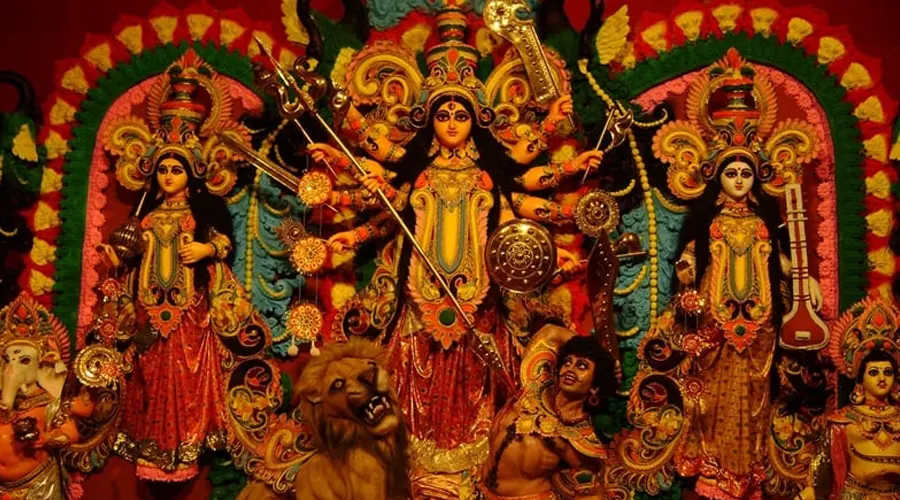Sharad Navratri 2021
Navratri is the symbol of nine days of the battle of the good against the evil with the result of the victory of the good on the tenth day. It is celebrated with great passion across Northern and Eastern India. During this period of nine days, Mother Durga is worshipped as the deity of power, energy, and wisdom.
Navratri 2021 starts on October 07, Thursday, and will end with the Vijaya Dasami celebration on October 15, Friday.
When is Navratri 2021 celebrated?
Navratri is celebrated twice a year—once during spring known as Chaitra Navratri and once during autumn known as Sharad Navratri.
Sharad Navratri 2021 or Maha Navratri will be celebrated during the Indian month of Ashvina that commences from the first day of the lunar fortnight. As per the English calendar, it will be in October.
The Festival is celebrated for nine nights and devotees pray, take part in the Dandiya Raas and Garba and offer prasad to please Goddess Durga.
Durga Puja is celebrated from the sixth day of Navaratri. And continue for 4 days and then end with Vijayadashmi.
Navratri festival dates in 2021
|
Day & Date |
Festival |
Tithi |
|
Saturday, October 17 |
Ghatasthapana |
Pratipada |
|
Sunday, October 18 |
Maa Brahmacharini Puja |
Dwitiya |
|
Monday, October 19 |
Maa Chandraghanta Puja |
Tritiya |
|
Tuesday, October 20 |
Maa Kushmanda Puja |
Chaturthi |
|
Wednesday, October 21 |
Maa Skandamata Puja |
Panchami |
|
Thursday, October 22 |
Maa Katyayini Puja |
Shashti |
|
Friday, October 23 |
Maa Kaalratri Puja |
Saptami |
|
Saturday, October 24 |
Maa Maha Gauri Puja |
Ashtami |
|
Sunday, October 25 |
Maa Siddhidaatri Puja, Maha Navami, Vijay Dasami |
Navami / Dasami |
Spiritual Significance of Navratri
According to mythology, there are different tales behind the origination of Navratri.
First:
Mahishashur, the King of Demons had started a war against the Gods in heaven. To combat him, all Gods including the trinity of Shiva, Brahma, and Vishnu pooled in their divine powers to give birth to the mother of power and 'Shakti'. Thus Goddess Durga was created and she with her power and wisdom killed Mahishasur after nine nights of the furious battle against him. The tenth day of victory is thus celebrated as Vijaya Dashami- the day of victory of good over evil.
Second:
Lord Rama was about to enter a war against Ravana to save Sita from his imprisonment in Lanka. Before starting the battle, Rama worshipped Goddess Durga seeking her blessings. For the puja, he required 108 lotuses. To complete the count, when Rama was about to remove one of his eyes, Goddess Durga emerged and blessed him with her divine 'shakti'.And because of the blessing from Goddess Durga, Rama won the battle on that day.
Third:
Uma, the daughter of Daksh—the king of the Himalayas is said to come home for ten days during Navratri. Uma was married to Lord Shiva and this festival celebrates her home coming on earth.
Rituals of Navaratri
During the nine nights of worship, Goddess Durga is worshipped for the first three days as ‘Shakti __the deity of power; the next three days she is worshipped as Lakshmi—the deity of wealth and the last three days, she is worshipped as Saraswati—the deity of knowledge and wisdom.
During this period, devotees keep fasts and usually avoid grains, onions, meat, and alcohol in their meals. Special Navratri food is prepared in North India for such devotees to keep a fast.
In Eastern India, Navratri is celebrated as Durga Puja and is the biggest festival throughout the year. Big pandals are set up, illuminated with light and different cultural activities are held during this time.
In Gujarat and Maharashtra, the Navratri dance is known as Garba and Dandiya where local people dance wearing traditional clothes and dandiya sticks in hand.
In Goa, special Zatras start during Navratri and the Saraswat Brahmin temples are decorated for the festival. Devotees worship the Dasha Maitrikas with sandalwood paste, kumkum, and new clothes & ornaments.
In Kerala, on the ninth day, Ayudha Puja is done to bless all the tools in the house.


Comments (0)